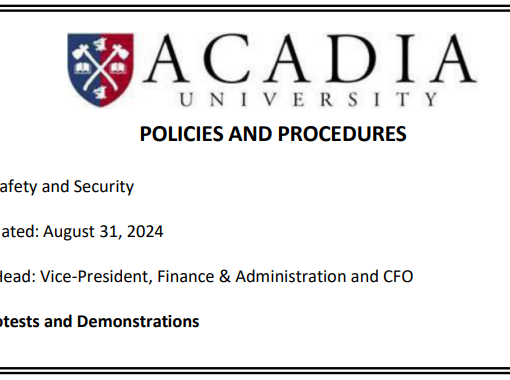Since I arrived at Acadia in the fall of 2014, I have had the privilege of voting in the Acadia Student’s Union General Election. I have always been a proud supporter of the ASU, and all that they provide to Acadia students. When election time rolls around, I read the candidates platforms, attend the candidates’ debate, and eventually cast my vote for who I feel will best represent me for the following academic year.
This year was no different, despite being on a Co-op work term in Saint John, New Brunswick. I was ecstatic when the ASU live streamed the candidates debate, as I thought it was such an amazing way to give those who could not attend, including students currently on exchange or in co-op, a chance to be present at the debate. Throughout the month of January, I spoke with many of my friends who are running for positions in the ASU, read their platforms on their Facebook pages, and became educated on the issues that they care about. When the day came to log onto Acadia Central and cast my vote, I felt that I was well educated on many of the issues brought up, and I knew who was receiving my vote. When I went to log on, I was greeted with a message under “ASU General Election: “there are no questions for you to answer.”
I was confused by this post, so I reached out to many of my other friends to see if they too were having this technical glitch. My friend who is also on a co-op term reached out to me to say that the message I was getting wasn’t a mistake, Co-op students are not eligible to vote in the ASU election. I was incredibly confused. I didn’t understand why I wasn’t eligible to vote, as I was always told that I was still considered an Acadia student while on a Co-op work term. After all, I pay $800 in Co-op fees for the semester, and am working towards a university credit. I decided to reach out to the Chief Returning Officer of the ASU to discuss the issue, and voice my concern over not being allowed to vote.
Shortly after, I received a reply. I was told that because Co-op students don’t pay winter fees to the Student’s Union, they are ineligible to vote. A brief apology was given, and I was told to reach out the Student Representative Council when I returned to Acadia in September. I was slightly baffled, so I went onto the ASU constitution to understand what she meant.
The ASU Constitution states that only Ordinary and Associate members are eligible to vote in the ASU General Election. An Associate member is defined as:
Associate members, who shall be all students who are registered at Acadia University as part-time students and have paid the prevailing membership fee for part-time student. Associate members defined: Any student registered in fewer than 3 courses.
So to clarify, if you are taking fewer than three Acadia courses, you are considered a part-time student, and as long as you pay your ASU membership fee, you are eligible to vote in the election. I then went on to see what the ASU fee for part-time students is. Financial services states that part-time students are required to pay $10.30 per 3H course taken at Acadia as a membership fee. With this conclusion, the $86.45 that I had paid in the fall semester to be part of the Students Union makes me less eligible to vote in an ASU election than the minimum $10.30 paid by part time students, because I had paid that due in a semester where the general election had not taken place.
One of the things about the Co-op program at Acadia that I am most thankful for is how it allows you to leave and develop as a professional in a working environment, while still holding close ties with the Acadia community and the wonderful resources that come with it. Co-op students are so tightly connected with Acadia while away, with many even taking additional courses through the university. By neglecting to include Co-op students as eligible members able to vote in the ASU election, they are seriously forgetting an important part of our small but close-knit community. Co-op students represent nearly every faculty at Acadia, and bring an important voice to the ASU. In addition, if a Co-op student is on a winter work term, more than likely they are currently third year students. They know the candidates well, and have experienced Acadia alongside them for many years. Most importantly, moving into their graduating year, they are directly affected by all of the decisions made by the ASU. By not allowing them to vote, they are taking away the opportunity for them to have their voices heard, and have a say in what really matters.
Every student, whether part time, full time, Co-op, or on exchange, deserves to have their voice heard in the ASU election. I love Acadia, and I truly care about the student body chosen to govern over it. I look forward to bringing this issue forward to the SRC in the 2017/2018 school year, and working to have this issue resolved.





